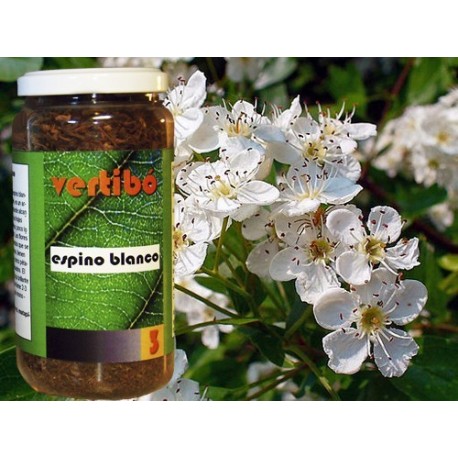No products
Prices are tax included
Online only
HERBS VERTIBÓ 03 - HAWTHORN
VERTIBO3
New product
HERBS VERTIBÓ 3 - HAWTHORN
Applications and effect:
In medicinal use, the active ingredients of the flowers are: tannin, flavonoids, essential oils, triterpenes and purine derivatives. Those of fruit: tannins, flavonoids, pigments and vitamins. It is used to treat heart and circulatory problems and hypertension.
SEE VIDEO HOW TO SET UP AN INFUSION:
This product is no longer in stock
More info
HERBS VERTIBÓ 3 - HAWTHORN
Container with about 100g.
Botanical description:
The Common Hawthorn is a shrub or small tree 5-14 m tall, with a dense crown. The bark is dull brown with vertical orange cracks. The younger stems bear sharp thorns, 1 to 1.5 cm long. The leaves are 2-4 cm long, obovate and deeply lobed, sometimes almost to the midrib, with the lobes spreading at a wide angle. The upper surface is dark green above and paler underneath.
The hermaphrodite flowers are produced in late spring (May to early June in its native area) in corymbs of 5-25 together; each flower is about 1 cm diameter, and has five white petals, numerous red stamens, and a single style; they are moderately fragrant. They are pollinated by midges, bees and other insects and later in the year bear numerous haws. The haw is a small, oval dark red fruit about 1 cm long, berry-like, but structurally a pome containing a single seed. Haws are important for wildlife in winter, particularly thrushes and waxwings; these birds eat the haws and disperse the seeds in their droppings.
It is distinguished from the related but less widespread Midland Hawthorn (C. laevigata) by its more upright growth, the leaves being deeply lobed, with spreading lobes, and in the flowers having just one style, not two or three. However they are inter-fertile and hybrids occur frequently; they are only entirely distinct in their more typical forms.
Applications and effect:
Crataegus monogyna is one of the most common species used as the "hawthorn" of traditional herbalism, which is of considerable interest for treating cardiac insufficiency by evidence-based medicine. The plant parts used medicinally are usually sprigs with both leaves and flowers, or alternatively the fruit. Several species of Crataegus have both traditional and modern medicinal uses. It is a good source of antioxidant phytochemicals,especially extracts of hawthorn leaves with flowers.
SEE VIDEO HOW TO SET UP AN INFUSION:
Reviews
No customer reviews for the moment.





